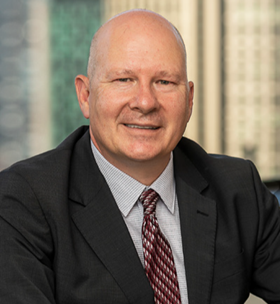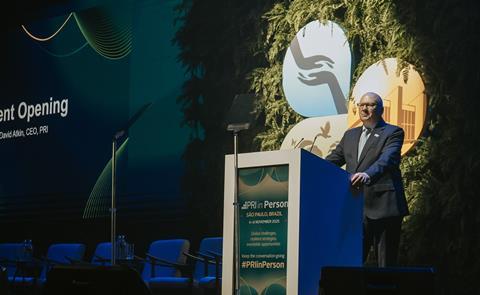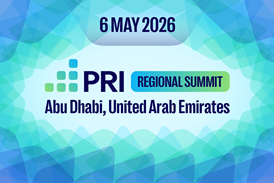By David Atkin, CEO, Principles for Responsible Investment

Last week, 1,300 responsible investors, policy makers, and sustainability leaders from 51 countries engaged with PRI in Person 2025 in São Paulo. The energy and ambition were palpable, as we explored how finance can drive the transition to a net zero, resilient, and inclusive global economy.
With the theme ’global challenges, resilient strategies, investable opportunities’, this conference was global, but also truly Brazilian. We were honoured to be joined in our opening session by Environment Minister Marina Silva and Banco do Brasil CEO Tarciana Medeiros, and to see how enthusiastically our signatory community from Brazil and across Latin America embraced the event. The launch of the Brazilian Sustainable Finance Taxonomy marked a major milestone, and local investors showcased a wealth of opportunities across Latin America.
Being in São Paulo just ahead of COP30 allowed us to work closely with the Brazilian government and send a strong signal to global policy makers. It was a privilege to be joined by Cristina Reis, Deputy Secretary for Sustainable Economic Development at the Ministry of Finance, Dan Ioschpe, High Level Climate Champion, a range of multi-lateral development banks and UNFCCC representatives ahead of their participation in Belém.
Catalysing investment in EMDEs
Our expert panellists examined how, when and where private finance is being incentivised to contribute to the Baku-to-Belém Roadmap goal of at least $1.3 trillion in climate finance annually by 2035. We asked our panel whether this vision is achievable with diverse actors and entrenched needs – with ’yes’ emerging as the clear answer. Progress is visible, but reaching the goal will require us to collaborate more, and to take a much more granular and targeted approach.
The PRI welcomes the Roadmap’s recognition of the critical role institutional investors can play in financing clean and resilient economies in emerging markets and developing economies (EMDEs) and is ready to engage with signatories to explore better tracking of investment flows, and to support policy makers in targeting the right investors with the right actions and opportunities.
A PRI policy briefing launched at the conference, ‘Unlocking and Mainstreaming Institutional Investment Flows’, outlines five targeted solutions to unlock capital at scale:
- Better match investors to EMDE capital needs by mapping investor types and building investable pathways.
- Support domestic financial market development through enabling regulation and deeper local investor bases.
- Champion innovation in instruments and asset classes, including blended finance and sustainability-linked bonds.
- Strengthen economic and investment incentives by aligning NDCs with credible investment plans.
- Improve access for EMDE companies to global financial systems and exchanges.
These solutions are actionable and they require coordinated leadership from governments, multilaterals, and investors alike.

A renewed focus on asset owners
There was considerable focus on how the asset owner community can leverage its unique strengths to support long term value creation. For the first time, this year we started the week with a Global Asset Owner Forum, attended by over 120 investors. Key themes included better articulating a common vision, ensuring asset owner leaders (CEOs and CIOs) are playing a more visible role, providing increased transparency on manager expectations, increasing policy engagement, and supporting innovation through capital allocation.
Emerging themes and new strategies
A complementary theme was the importance of managing system level risks. To this end, speakers highlighted the importance of increasing industry resources towards policy engagement, and creating more platforms for asset owners to assess system level risks.
In a plenary on geopolitics, different approaches to defence investments within the industry were welcomed, as well as an acknowledgement that further co-operation is needed. Examples of specific initiatives defining systemic approaches to complex issues were cited, such as the Global Investor Commission on Mining 2030.
Across the agenda, investors highlighted continued progress on their practices across a wide range of factors, including climate, nature and social issues, despite the industry facing headwinds. In our debate ‘Is the ESG backlash good for responsible investment?’, arguments highlighted the benefits of an evolution in the industry, new capabilities, evidence and eradicating greenwash – versus the politicisation of risk management, the undermining of investor rights and fiduciary duties, and increased client costs. After a spirited debate, the majority of the audience voted ‘no’ in response to the question.
It’s clear there is a continued need to convene the industry to help navigate these headwinds. This is very much in the spirit of the ‘Mutirão’ and the Brazilian government’s call in the opening plenary for cooperation and strengthened multilateralism.
If one thing is clear, it’s that the economic case for the transition is stronger than ever. And aligning policy and investment with that reality can accelerate the global transition to net zero
Looking ahead to COP30
São Paulo truly served as the gateway to COP30, and there was a real energy and engagement to the week’s discussions, both on and off the PRI in Person stage. Alongside the conference, there were a record-breaking 70 side events, covering a huge spectrum of sectors, asset classes and sustainability issues.
As we transition from São Paulo to Belém, where COP30 has just begun in earnest, the PRI’s role is to channel the voice of responsible investors. COP30 represents a pivotal opportunity to align global climate ambition with the financial architecture needed to deliver it. Investment in the transition must reach US$4.5 to US$6.5 trillion per year by the early 2030s – but the cost of inaction or delay is far greater.
We urge policy makers gathering in Belém to take bold steps:
- Phase out fossil fuel subsidies and redirect support to clean energy and resilience;
- Create investable approaches to Nationally Determined Contributions (NDCs);
- Build strong, credible policy frameworks that attract private capital, especially in EMDEs.
I’m on the ground at COP30 to support policy makers in delivering on their commitments, and to support our signatories in scaling their impact. This year we’ve tracked around 40 of our investor signatories attending and supported around half that number in obtaining access to the blue zone.
Case for transition ‘stronger than ever’
If one thing is clear, it’s that the economic case for the transition is stronger than ever. And aligning policy and investment with that reality can accelerate the global transition to net zero. We’re hosting a wide range of events and will be participating in the Presidency’s events on the Baku to Belém Roadmap, Transition Planning, Sustainable Finance Taxonomies and Country Platforms. We’ll also be joining an exclusive asset owner convening hosted by the COP30 Presidency and, as Secretariat to the Taskforce on Net Zero Policy, supporting the launch of its next milestone report ’Policy Matters: From Pledges to Delivery – A Decade After Paris’, which reflects on the ongoing development of net zero corporate and financial policy.
Thank you to everyone who joined us in São Paulo, and to my brilliant PRI team for pulling off another successful event; you certainly made my last PRI in Person as CEO one to remember. Let’s carry this momentum forward.











